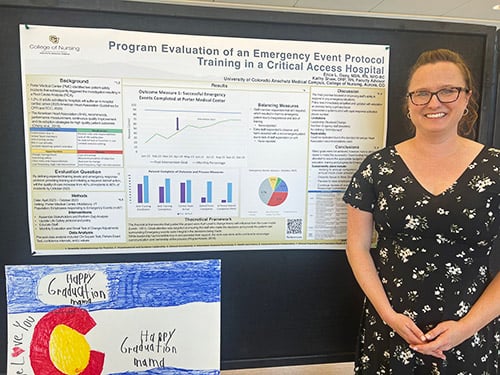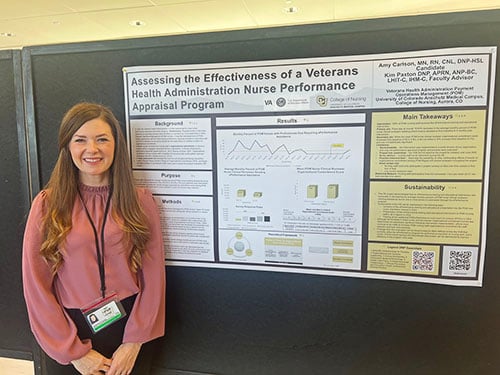Doctor of Nursing Practice students at the University of Colorado College of Nursing at Anschutz Medical Campus are addressing issues in the healthcare system and finding ways to make them better.
Nineteen students presented their final project for their respective DNP programs on Friday, December 15 before fall commencement.

CU Nursing student Erica Guay, MSN, RN, NPD-BC, with her final DNP project poster. |
Erica Guay, MSN, RN, NPD-BC, was a student in CU Nursing’s Health Systems Leadership DNP program. She evaluated emergency protocol training at a small, 22-bed hospital in Middlebury, Vermont. She found the hospital needed help with responding to emergencies and figuring out which healthcare professionals should be responding.
Guay started her project in September 2022. She says when she first started, 20% of the hospital’s response to emergency events was successful. That number increased to 75% when her project was finished. Typically, a successful response includes things like communication, staff responsibilities, and safety.
“We really blew up their protocol,” Guay says. “We focused on policy, team meetings, and debriefs to find out how they could improve. Hospital staff get a feel for what they learned, what went wrong, and how to get better.”
Guay says the hospital has a committee in place to give further guidance and direction. The hospital’s emergency response policy was simplified and updated to focus on education. Grant funding will help with education and further training, including implementing mock code simulations.
“You don’t need to make these big, grandiose changes,” she says. “We gave the hospital a little nudge in the right direction. People responded and it was nice to see that impact.”
Streamlining a Nurse Appraisal Program

CU Nursing student Amy Carlson, MN, RN, CNL, with her final DNP project poster. |
Amy Carlson, MN, RN, CNL, was also part of the Health Systems Leadership DNP program. Her project focused on improving a nurse appraisal program, called ePerformance. She works remotely for the VA in Montana and says nurses in her department struggled using it because of a lack of training and education on the program.
“My primary aim was to look at decreasing the monthly percentage of nurses needing assistance with the program due to one or more errors in their performance appraisal submission,” she says. “I found that performance appraisal has very strong ties to organizational commitments among nursing staff. So I wanted to look at that too because we had noticed that our all-employee survey results in our department had decreased since 2020.”
Carlson gave nursing staff pre- and post-intervention surveys and conducted educational and training sessions. She took the survey responses and collaborated with ePerformance support to determine what needed to change. Her department went from about 45% of nurses needing assistance with ePerformance per month to about 28%.
“My supervisor and nurses in my region are happy with this new process because it makes them more efficient workers. They’re able to provide better care,” she says. “Before, if there was an error in submitting the ePerformance, the nurse manager would have to look at it, go to HR, and start the process over again. It was consuming a lot of my time, my supervisor’s time, and nurses’ time.”
Carlson says the DNP-HSL program will help her take the next steps in her career at the VA.
“I appreciated how CU Nursing broke down all of these different DNP project steps into courses so you could focus on things like methods and data collection,” she says. “You could get a good overview of what each step involves, and I feel like this is a well-rounded program and I’m well prepared for the future.”



